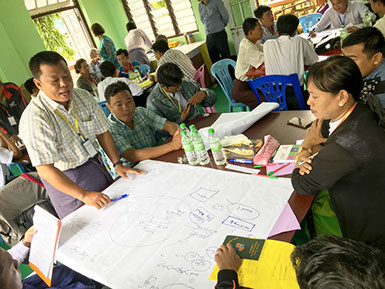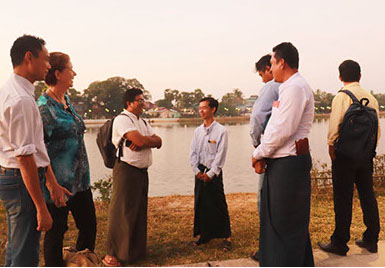Annual Update 2020 VNG International

Participants of the Myeik public hearing discuss the prioritisation of infrastructure projects.

The Clean and Green Myeik group (CSO), together with Mr Aung Aung Oo (left), Social Accountability expert Ms. Lucia Nass (2nd left) and Mr Min Thuya (3rd left) on the banks of the clean lake project in Myeik.
‘People ask us why we work on waste to improve governance? It is because waste is not just a problem of households, or of CSOs, or of businesses, or of the community.
Waste is a public problem, and we have to work together to solve it. We may disagree along the way, but we have to work together.’
A Ward Administrator and `
Clean Dawei presenter
‘There are enough steps to take towards full participatory, inclusive and meaningful citizen consultation, but the Myeik example is nonetheless an important step away from the previously self-fenced Sipins in Tanintharyi Region.’
Mr. Aung Aung Oo,
Project Manager Loka Ahlinn
(MAGIC implementing partner)
Involving Citizens in Decision Making by strengthening democratic local government
Featured Project
Myanmar, Municipal Accountability, Governance and Inclusive Communities in Chin State and Tanintharyi Region (MAGIC)
The MAGIC project works on two interrelated areas: strengthening the technical capacity of the municipality – the Township Development Affairs Organisation and Committee (TDOA and TDAC – together called Sipin) – and the involvement of citizens in decision making. These two ‘legs’ are closely interrelated and aligned. This approach of working both on the technical side and on citizen participation, which has been elaborated in the so-called MAGIC roadmap, is exceptional in Myanmar.
Some of the results achieved so far:
- Until early 2020 seven interface meetings or public hearings took place in five townships with a total of 705 participants.
- Stemming from the MAGIC roadmap citizens together with their Sipin choose a service that needs to be improved. Citizens from all five townships selected waste management as the service for improvement.
- The Myeik Sipin developed itself into an institution that tries to be responsive, works closely with its citizens and discloses information to the public through their Facebook page. They even shared their annual municipal budget with their citizens, which is unique in Myanmar.
- In Myeik the Sipin organised a public meeting in the townhall to discuss the preparation of the annual budget. In total 158 people participated.
- In all MAGIC townships local CSOs (Clean Dawei, Clean and Green Myeik etc.) have been established to work on waste management together with the Sipin, with great first results: outside the scope of MAGIC, community awareness raising campaigns and cleaning days were often organised. Everything was published and promoted on their Facebook pages.
- Also the first spill-overs to townships that are not a direct partner in the MAGIC project can now be seen: following the Myeik example, Palaw township organised a public hearing workshop for preparation of their 2020-2021 budget.
It is interesting to have a closer look at the Sipin in Myeik. In the past, the Sipin only showed the budget to ward administrators. During the first public hearing workshop the Sipin explained what they were planning to do. The participants asked for the rationale behind some infrastructure projects, raised issues and difficulties. Hereafter, the participants were divided into smaller groups for a prioritisation. Their main priorities were road construction, drainages and encroachment of public areas.
A great result was that the participants also pointed out that besides this session, they still felt the process could be enhanced. They requested the Sipin to visit the wards and observe actual needs of citizens.